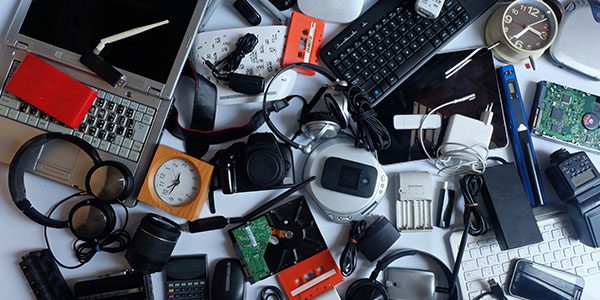Elevate Your E-Waste Monitoring With R2 Qualification: a Detailed Introduction
One trick method to raise e-waste monitoring practices is by acquiring R2 accreditation. By checking out the benefits and procedures connected with R2 qualification, a much deeper understanding of just how it can transform e-waste administration strategies emerges, dropping light on a course in the direction of sustainability and ethical disposal practices.
Importance of E-Waste Monitoring

When e-waste is not handled appropriately, these hazardous materials can leak into the ecological community, causing injury to wildlife and possibly entering the food chain, posturing dangers to human wellness. Additionally, the inappropriate disposal of e-waste contributes to contamination and greenhouse gas emissions, worsening environment modification and ecological destruction.

Advantages of R2 Qualification

First of all, R2 certification improves credibility by showcasing a company's dedication to lasting techniques. It assures clients, partners, and stakeholders that the business complies with strict criteria for e-waste management - r2 certification. This integrity can lead to boosted count on and enhanced partnerships with clients that focus on ecological responsibility
Second of all, R2 qualification helps alleviate threats associated with incorrect e-waste disposal. By adhering to the rigorous guidelines set forth by the accreditation, companies can lessen the possibility of data violations, ecological contamination, and lawful repercussions. This proactive method safeguards the business's online reputation and minimizes potential obligations.
Finally, R2 qualification shows a dedication to ecological stewardship - r2 certification. By sensibly taking care of electronic waste through certified processes, organizations add to the conservation of resources, reduction of pollution, and promotion of a circular economic climate. This commitment not only profits the environment but also aligns with evolving consumer assumptions for lasting organization practices
R2 Accreditation Process Overview
Having developed the advantages of R2 accreditation in promoting trustworthiness, danger mitigation, and environmental stewardship, it a fantastic read is necessary to now describe the comprehensive process associated with getting this accreditation. The R2 accreditation process starts with a detailed testimonial of the organization's operational plans and treatments to guarantee compliance with the R2 criterion. This preliminary assessment is crucial in recognizing any kind of spaces that need to be resolved before continuing additionally.
When the company's techniques align with the R2 standard needs, an independent third-party auditor carries out an on-site audit to evaluate the execution and effectiveness of these techniques. This audit includes a comprehensive evaluation of documentation, meetings with staff, and physical examinations of facilities to validate compliance.
Adhering to a successful audit, the company receives a qualification choice based on the auditor's findings. If accepted, the company is given R2 accreditation, demonstrating its commitment to responsible e-waste monitoring. It is necessary to keep in mind that preserving R2 qualification requires continuous conformity with the standard's demands and periodic audits to make certain continued adherence to finest techniques in e-waste recycling and disposal.
Key Requirements for R2 Conformity
A vital facet of achieving R2 compliance is making sure that all electronic waste (e-waste) processing facilities fulfill stringent environmental and security criteria. To abide by R2 requirements, organizations need to follow essential requirements that concentrate on liable e-waste management practices. These requirements include carrying out a recorded ecological, health, and safety administration system, making sure the safe and secure handling of data-containing tools, and conducting extensive downstream due diligence to track the final destination of e-waste products.
Moreover, R2 compliance requires the appropriate testing, refurbishment, and recycling of electronic equipment to extend its helpful life and decrease ecological effect. Facilities seeking R2 accreditation should my sources likewise prioritize worker health and safety and security by giving needed training, individual safety devices, and a safe workplace. In addition, keeping detailed records of e-waste handling tasks and regularly undergoing audits by approved licensing bodies are crucial elements of demonstrating recurring conformity with R2 requirements.
Influences of Lasting E-Waste Practices
The execution of lasting e-waste methods based on R2 conformity not just ensures ecological and security criteria are met yet likewise considerably impacts the total lifecycle of electronic items. By adhering to R2 standards, electronic waste management procedures become extra effective, decreasing the ecological impact of electronic products. Lasting e-waste practices assist in the proper disposal of digital components, making sure that dangerous products are managed responsibly and do not finish up contaminating the atmosphere.
Furthermore, sustainable e-waste techniques can add to work creation in the recycling and refurbishment industries, promoting economic growth while promoting environmental obligation. Generally, the fostering of lasting e-waste techniques under R2 qualification offers as a critical action in the direction of achieving a more environmentally sustainable electronics industry.
Verdict
In conclusion, implementing proper e-waste management techniques is critical for ecological sustainability and source preservation. R2 accreditation plays a key function in guaranteeing responsible handling and disposal of electronic waste. By sticking to the rigorous requirements stated by R2 requirements, organizations can not only minimize their environmental impact but additionally add to a much more sustainable future for generations ahead.
One key technique to raise e-waste management practices is by attaining R2 qualification. By checking out the benefits and processes associated with R2 qualification, a deeper understanding of how it can change e-waste administration methods arises, dropping light on a path in the direction of sustainability and honest disposal techniques.
The R2 qualification process starts with a detailed evaluation of the organization's functional policies and treatments to ensure compliance with the R2 criterion. If approved, the company click this site is given R2 qualification, demonstrating its dedication to accountable e-waste monitoring. Overall, the fostering of sustainable e-waste methods under R2 certification serves as a crucial action in the direction of accomplishing an extra environmentally sustainable electronic devices industry.